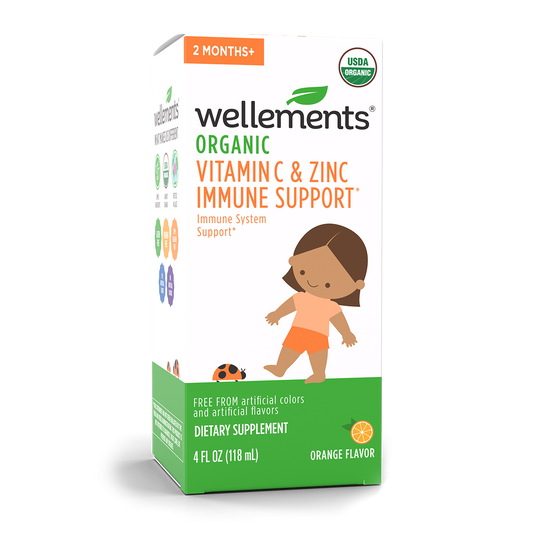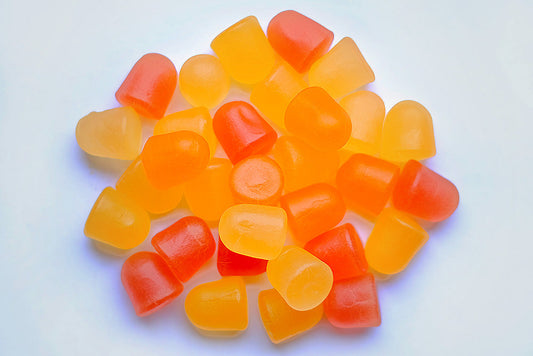The Health Benefits of Vitamin C & Zinc for Kids
| updated:Share

Parenting is challenging, stimulating, and rewarding (most days). Despite how excellent they are at raising their kids, most parents question their choices. One constant source of concern is whether their child's diet is healthy enough.
Children need balanced nutrition. Vitamins and minerals, especially during early development, are crucial. Vitamin C and zinc are among the most important nutrients for children. Both essential nutrients support the immune system, which is vital to protecting your child from and fighting against infections.
Related Product: Vitamin C & Zinc Immune Support
Why Is Vitamin C Important?
As an antioxidant, vitamin C is beneficial to the body. The vitamin aids the production of white blood cells, including lymphocytes and phagocytes, ensuring a correct immune response to foreign material.
Vitamin C is an antioxidant and protects white blood cells against free radicals. Free radicals lead to oxidative stress, which can lead to inflammation and inflammatory diseases.
Unfortunately, the body does not produce vitamin C naturally. As a water-soluble vitamin, the body requires routine replacement. Children can often get enough of the nutrient through diet; however, experts suggest using a multivitamin, such as Wellements Organic Multivitamin Drops, to supplement needs.

Why Is Zinc Important?
Zinc is essential to your child's growth and development as a trace mineral. The mineral plays a vital role in the body, including:
- Wound healing
- Immune function
- DNA synthesis
- Protein synthesis
- Gene expression
- Enzymatic reactions
Children do not need a significant amount of zinc in their diet. According to nutritionists, if a child has no significant dietary restrictions, they should receive enough zinc from a balanced diet. If you think your little one isn't getting enough zinc, talk to their pediatrician and seek a diagnosis.
Best Sources of Vitamin C for Kids
Vitamin C is present in many healthy foods. Some of the best vitamin C-rich foods include:
- Kiwis
- Guavas
- Strawberries
- Papayas
- Grapefruits
- Tomatoes
- Bell peppers
- Broccoli
The amount of vitamin C your child needs will vary by age. Current nutritional guidelines suggest:
- 15 mg of vitamin C for kids 1 to 3 years
- 25 mg of vitamin C for kids 3 to 8 years
- 45 mg of vitamin C for kids 8 to 13 years
- 75 mg of vitamin C for males and 65 mg for females 14 to 18 years

Best Sources of Zinc for Kids
Zinc is present in many foods, including fortified cereals. According to health professionals, the best food sources for zinc include:
- Shellfish
- Poultry
- Pork
- Beef
- Nuts and seeds
- Legumes
- Whole grains
While zinc supplements are available, you want to be careful because too much zinc can cause problems. Before starting your child on any supplement, consult with their pediatrician. Health professionals prefer people get nutrients straight from the source.
Zinc & Vitamin C Supplements for Your Child
Most children do not need a zinc supplement. If your child has a zinc deficiency, their pediatrician will probably prescribe a supplement or provide dietary guidance. Attempting to correct deficiencies without medical advice can cause zinc toxicity.
Unlike zinc, too much vitamin C is unlikely to be harmful to your child. Therefore, you can include a vitamin C supplement or a multivitamin in your child's diet. Still, the only reason to supplement the vitamin is if your little one is a picky eater and you fear they are not getting enough.
Zinc and vitamin C are essential nutrients and crucial to your child's growth and development. While parents should exercise caution when considering zinc supplements, vitamin C supplements are safe and beneficial. Running a household is challenging, but there is nothing you wouldn't do for your little ones, primarily to ensure their health. Wellements is the first solely certified-organic brand of supplements and remedies created for little ones. If you are considering multivitamins and supplements, consider Wellements.
4.2 /
5.0
(12)
12
total reviews
Vitamin C & Zinc Immune Support
Sale price
$14.99
Sources:
https://www.hsph.harvard.edu/nutritionsource/zinc/
https://hiyahealth.com/blogs/news/how-much-vitamin-c-do-kids-need-to-stay-healthy
https://ods.od.nih.gov/factsheets/Zinc-HealthProfessional/



